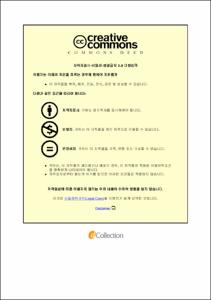사회불안 경향이 있는 간호대학생을 위한 긍정정서 강화 프로그램 개발 및 효과검증
- Issued Date
- 2020-08
- Abstract
- This study was conducted to develop and implement a positive emotions reinforcement program to reduce social anxiety among nursing students prone to it and to verify potential effects of the developed program.
The consists of 11 sessions positive emotions einforcement program is based on the broaden-and-build theory of positive emotions. This study uses a quasi-experimental time-series design of before, after, and follow-up of the intervention with a nonequivalent control group.
Data were collected between February to May 2019, and subjects were freshmen and sophomores of a university in G city; twenty subjects from the experimental group and 19 from the control group were used for the final analysis.
For the statistical analysis of the data, the software SPSS/WIN 22.0 was used, and the Chi-square test, and Fisher's exact test, independent t-test, and Mann Whitney U-test were conducted as a pre-homogeneity test. To validate the study's hypothesis, repeated measures ANCOVA.
The study results are outlined as follows:
1) Hypothesis 1: 'The experimental group participating in the positive emotion reinforcement program and the non-participating control group will have different emotional experiences with the progress of time.' As a result, after the positive emotion reinforcement program was implemented, the positive emotion was statistically significant for the passage of time (F=6.82, p=.002) and the interaction between the group and time (F=11.43, p<.001), negative emotion was a statistically significant difference between the passage of time (F=3.19, p=.048) and the interaction between the group and time (F=3.12, p=.049). Therefore, hypothesis 1 was accepted.
2) Hypothesis 2: 'The experimental group participating in the positive emotion reinforcement program and the non-participating control group will have different interpersonal relationships with the progress of time.' There was a statistically significant difference in the interpersonal relationship between the passage of time (F=9.73, p<.001) and the interaction between the group and time (F=14.87, p<.001) after the positive emotion reinforcement program. Therefore, hypothesis 2 was accepted.
3) Hypothesis 3: 'The experimental group participating in the positive emotion reinforcement program and the non-participating control group will have different in the resilience with the progress of time.' There was a statistically significant difference in the resilience between the passage of time (F=12.85, p<.001) and the interaction between the group and time (F=11.98, p<.001) after the positive emotion reinforcement program. Therefore, hypothesis 3 was accepted.
4) Hypothesis 4: 'The social anxiety score of the experimental group participating in the positive emotions reinforcement program will decrease compared to the control group without participation in the program with the progress of time." There was a statistically significant difference in the social anxiety between the group (F=11.62, p=.002), passage of time (F=4.65, p=.016) and the interaction between the group and time (F=3.97, p=.028) after the positive emotion reinforcement program. Therefore, hypothesis 4 was accepted.
Based on these results, the positive emotions reinforcement program was found to be an effective intervention to enhance positive emotions, reduce negative emotions, improve interpersonal relationships, increase resilience, and reduce social anxiety among nursing students. Therefore, the program can be considered as a measure that can be utilized as a non-curriculum course for social anxiety-prone nursing students.
본 연구는 사회불안 경향이 있는 간호대학생을 위한 사회불안 감소를 위한 긍정정서 강화 프로그램을 개발하고 적용하여 그 효과를 검증하기 위한 목적으로 실시되었다.
긍정정서 강화 프로그램은 긍정정서 확장 및 축적 이론을 토대로 11회기로 구성하였다. 연구설계는 비동등성 대조군 전, 후, 추후 시계열의 유사실험 설계이다. 자료수집 기간은 2019년 2월부터 2019년 5월까지 이루어졌으며, 연구대상은 G시 일개 대학 1, 2학년을 대상으로 하였으며, 실험군 20명, 대조군 19명을 최종분석 대상으로 하였다. 자료분석은 SPSS/WIN 22.0 Program을 이용하여, 사전 동질성 검증은 Chi-square test와 Fisher's exact test, independent t-test 및 Mann Whitney U-test를 실시하였다. 가설검증은 repeated measured ANCOVA를 실시하였다.
연구결과는 다음과 같다.
1) 제 1가설: '긍정정서 강화 프로그램에 참여한 실험군과 참여하지 않은 대조군은 시간의 경과에 따라 정서경험에 차이가 있을 것이다.' 그 결과 긍정정서 강화 프로그램 실시 후 긍정정서는 시간의 경과(F=6.82, p=.002)와 집단과 시간 경과의 교호작용(F=11.43, p<.001)은 통계적으로 유의하였고, 부정정서는 시간의 경과(F=3.19, p=.048)와 집단과 시간 경과의 교호작용(F=3.12, p=.049)은 통계적으로 유의한 차이가 있었다. 따라서 제 1가설은 지지되었다
2) 제 2가설: '긍정정서 강화 프로그램에 참여한 실험군과 참여하지 않은 대조군은 시간의 경과에 따라 대인관계에 차이가 있을 것이다.' 긍정정서 강화 프로그램 실시 후 대인관계는 시간의 경과(F=9.73, p<.001)와, 집단과 시간 경과의 교호작용(F=14.87, p<.001)은 통계적으로 유의한 차이가 있었다. 따라서 제 2가설은 지지되었다.
3) 제 3가설 : '긍정정서 강화 프로그램에 참여한 실험군과 참여하지 않은 대조군은 시간의 경과에 따라 회복탄력성에 차이가 있을 것이다' . 긍정정서 강화 프로그램 실시 후 회복탄력성은 시간의 경과(F=12.85, p<.001)와, 집단과 시간 경과의 교호작용(F=11.98, p<.001)은 통계적으로 유의한 차이가 있었다. 따라서 제 3가설은 지지되었다.
4) 제 4가설 : '긍정정서 강화 프로그램에 참여한 실험군과 참여하지 않은 대조군은 시간의 경과에 따라 사회불안에 차이가 있을 것이다.' 긍정정서 강화 프로그램 실시 후 사회불안은 집단 간 (F=11.62, p=.002), 시간의 경과(F=4.65, p=.016)와, 집단과 시간 경과의 교호작용(F=3.97, p=.028)에서 통계적으로 유의한 차이가 있었다. 따라서 제 4가설은 지지되었다.
이상의 결과로 긍정정서 강화 프로그램은 간호대학생의 긍정정서 향상, 대인관계 향상, 회복탄력성 향상 및 사회불안을 감소시키는데 효과적인 중재로 검증되었다. 따라서 저학년 사회불안 경향이 있는 간호대학생에게 비교과과정으로 활용할 수 있는 적극적인 방안 검토가 필요하다.
- Alternative Title
- Development of positive emotional reinforcement program for nursing students with social anxiety-prone
- Awarded Date
- 2020-08
- Degree
- 박사
- Citation
- 이소영. (202008). 사회불안 경향이 있는 간호대학생을 위한 긍정정서 강화 프로그램 개발 및 효과검증.
- Type
- Thesis
- Appears in Collections:
- 2. College of Nursing (간호대학) > 박사
- 파일 목록
-
-
Download
 THESIS-Nursing-2020-010.pdf
기타 데이터 / 1.85 MB / Adobe PDF
THESIS-Nursing-2020-010.pdf
기타 데이터 / 1.85 MB / Adobe PDF
-
Items in Repository are protected by copyright, with all rights reserved, unless otherwise indicated.